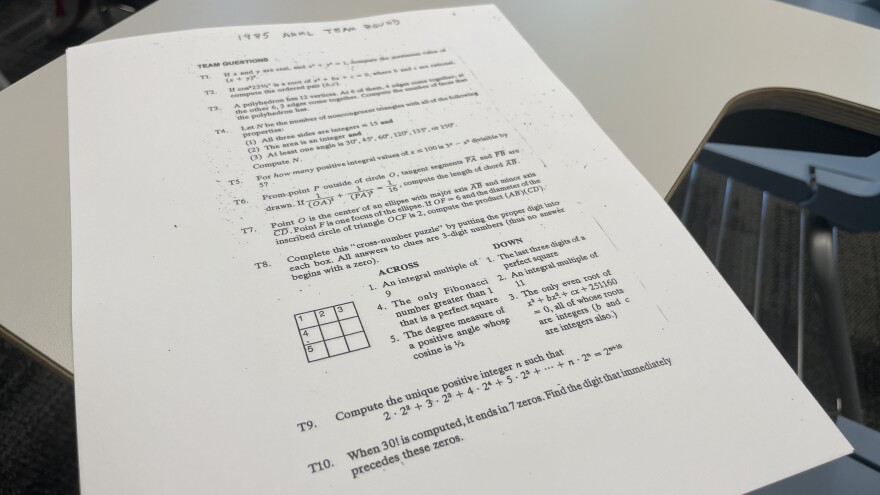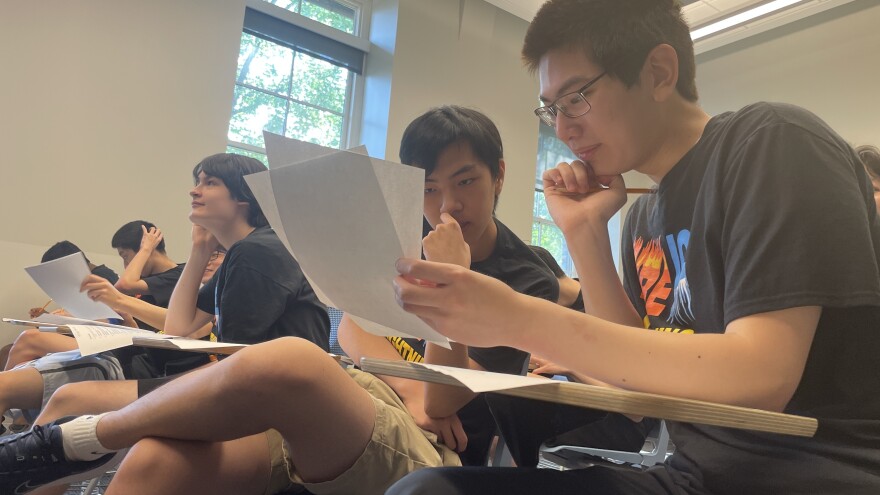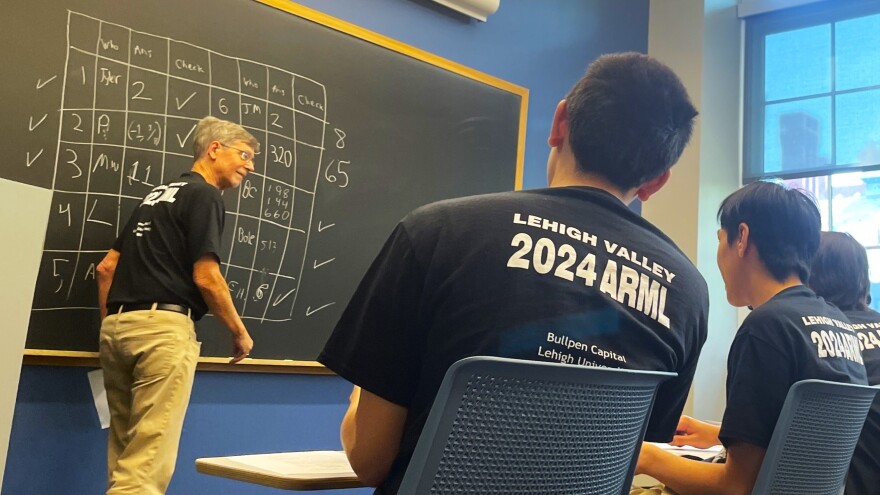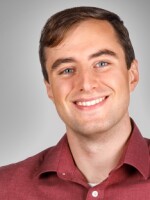BETHLEHEM, Pa. — When you think of regions full of math powerhouses, one might think of the San Francisco Bay, or perhaps New York City or the nation's capital.
But what about the Lehigh Valley?
The start of June saw the American Regions Mathematics League compete with 113 top high school teams from the San Francisco Bay Area, Texas, New York City, San Diego and other major metropolitan areas in the country.
And after a series of intense math competitions, at the top of the standings was Pennsylvania's Lehigh Valley.
"But this year, we were able to get our act together and beat them, which was very exciting."Lehigh Valley math team coach Don Davis
More than 1,600 students from the United States, Canada, China and South Korea participated in the competition this year, according to the organizers.
Coach Don Davis, who led the Lehigh Valley team and had gone for more than a decade without a winning season, said its biggest competition in recent years was the second-place finisher San Francisco Bay team.
"They had a huge, huge operation there and a huge number of really smart kids to draw from Stanford and Berkeley and all the tech companies' kids," Davis said.
"But this year, we were able to get our act together and beat them, which was very exciting."
Some difficult battles
The team stormed onto the scene with a string of three wins starting in the late '00s, but despite his team continuing to be strong finishers, Davis said a first-place finish had eluded it until now.
Over a multi-stage event consisting of a team round, individual round, relay round and "power round," the student teams competed over challenging mathematics problems.

They often were difficult battles, done so at an advanced high school math level (as in no calculus) consisting of word problems and proofs.
This year, the group had four 15-person teams. While the lower teams performed OK, the joy came from the lead team clenching the victory.
The contest takes place simultaneously at five sites: Penn State, University of Alabama at Huntsville, University of Iowa, and University of Lausanne, and University of Nevada at Reno. Competitors for the Lehigh Valley team went to Penn State to compete.
Coach gets victory after a decade
Davis came to Lehigh University as a professor and researcher in 1974 after getting degrees at MIT and Stanford, but it took until he was well into his career to be exposed to this world.
"I didn't know about it until 1993, when a local student who had won my [high school math] contest told me about it," Davis said.
Inspired by the students' direction, Davis formed an initial Lehigh Valley team in 1993 of 15 local students.

"We did OK, but not great," Davis said.
He said the best the group did as a purely local team was 10th place, but after Philadelphia's team disbanded, many from that city joined the Lehigh Valley team in 2005.
They became about a third of the team — and that year, the team won.
Davis said that afterward, the team "sort of got famous," and added some kids from New Jersey and others from the region, expanding to as many as five 15-person teams at times.
"It was an amazing feeling. I was really so happy for our head coach especially because, I mean, he worked so hard with every week having these practices,"Lehigh Valley team member Tyler Fengya
Three national championships were later won in 2009, 2010, and 2011, along with many second- and third-place finishes before and after those wins.
But since then, despite consistently high placements and hard work, no championship has come — until now.
"It was an amazing feeling," team member Tyler Fengya from Clifton, New Jersey said. Fengya said he loves the aesthetic nature of math and the problems.
"I was really so happy for our head coach especially because, I mean, he worked so hard with every week having these practices," he said.
Broader talent pool, same name
Davis said the current group participating consists of just under a quarter of local Lehigh Valley kids from schools such as Parkland and Moravian Academy.
But he said he always wanted to keep the team's name, and students still all come to Lehigh to practice, even as some travel as much as 90 minutes each way.
Alexander Wong, a 10th grader at Millburn High School in New Jersey who was on the U.S. Math Olympiad team, was on the Lehigh Valley team, and was one of only two to get a perfect score in the individual competition.

Davis said it was the first time a student of his won first place in the individual awards, outpacing the other competitor in a tiebreaker.
Davis said the team wants to keep a positive atmosphere and environment that makes kids want to practice, rewarding them and having them set specific goals for each practice.
"The easiest problem almost everybody will get right," Davis said. "And the hardest problem, then, hardly anybody will get right. And so we always practice those."
Davis said he prepares his practices "very carefully."
An important outlet
After 50 years of teaching, Davis said this year he plans to retire from his Lehigh professor position.
But he said being done teaching does not mean that he's done with this team.
He said he still plans to coach and contribute some research as he is able for "at least a few more" good years.
"These kids are so smart in math that most of them at their own schools — they're just apart from everybody else, I think. And so they're really happy to come together with other kids who are like they are. It's a great pleasure to bring me to do this coaching."Lehigh Vally math team coach Don Davis
He said he appreciated being able to connect the students and reduce social barriers through the program.
"These kids are so smart in math that most of them at their own schools — they're just apart from everybody else, I think," Davis said.
"And so they're really happy to come together with other kids who are like they are. It's a great pleasure to bring me to do this coaching."

He said among training PhD students and published research on topics such as algebraic topology, he thinks the most exciting part of his career has been coaching the high school kids.
Davis said they had been able to put up multiple teams because of the financial assistance of Doylestown residents and Bullpen Capital founder Paul Martino, who Davis offered assistance when Martino was completing a grade-school science project related to fractals.
'Encourages deep skill'
Martino then came to Lehigh as a math and computer science major and decided to financially back the effort, and praised the outlet that such a program can provide and Davis' role.
"Probably in those years, '09 '11 and '12, he probably didn't have the best kids across the country," Martino said. "But he had the best coaching."
Martino said that this year's victory was one on "even footing" with other groups catching up to Davis' coaching techniques.
"So it was really an exciting year to kind of see him back on top, after he kind of beat them at their own game in the early days."Bullpen Capital founder Paul Martino
"So it was really an exciting year to kind of see him back on top, after he kind of beat them at their own game in the early days," Martino said.
Martino said it's important to give kids gifted in math and their parents helpful and supportive avenues, and that way more people should give to math teams,
He said it not only encourages a deep skill, but provides amazing socialization for the high school kids involved.
Davis said the team also received significant assistance over the years from University of Scranton professor Ken Monks, as well as, in recent years, Lehigh professors Xianyi Zeng and Si Tang.
Davis said that for those interested, math camps or online courses can be good starts, given that it's a high-level challenge.
Reporter Will Oliver contributed to this report.


